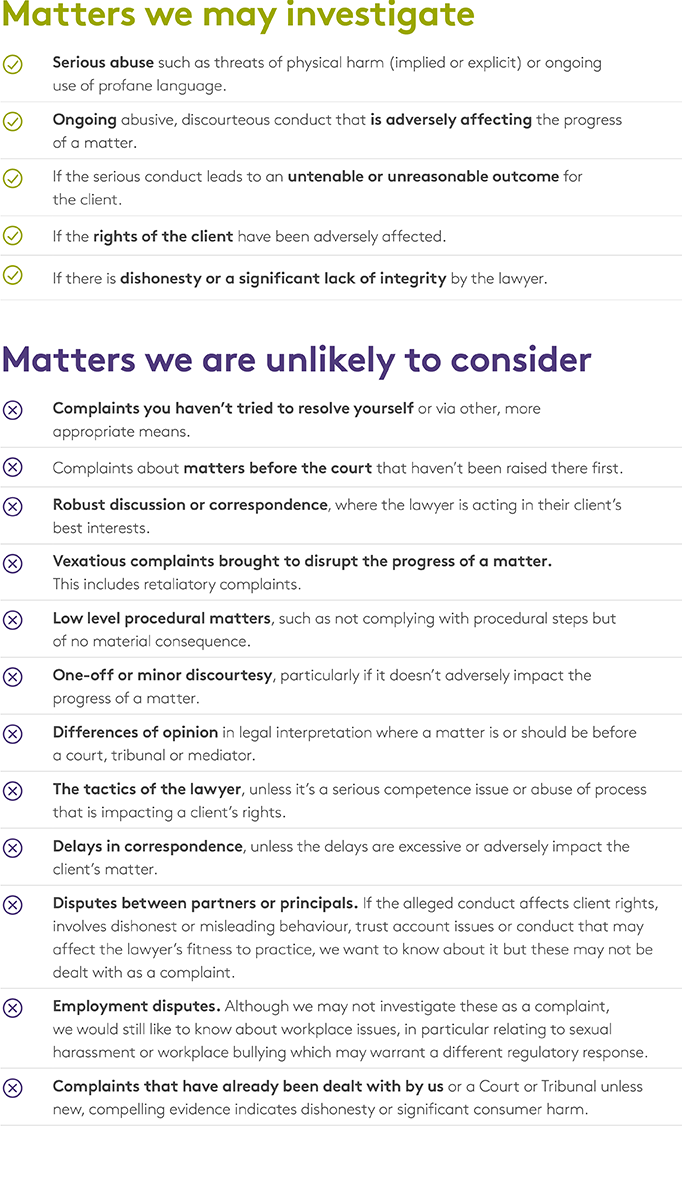- PDF doc
- 774.29 KB
We often receive complaints by lawyers about the behaviour of other lawyers who they engage with in the course of legal practice. Some of the issues raised in these complaints do not warrant our intervention. Others could or should have been resolved between the lawyers directly.
We have outlined below the types of complaints we may investigate and those we are unlikely to consider. Please read the full operational guideline for detailed information on complaints by lawyers about lawyers here.

Matters we may investigate:
- Serious abuse such as threats of physical harm (implied or explicit) or ongoing use of profane language.
- Ongoing abusive, discourteous conduct that is adversely affecting the progress of a matter.
- If the serious conduct leads to an untenable or unreasonable outcome for the client.
- If the rights of the client have been adversely affected.
- If there is dishonesty or a significant lack of integrity by the lawyer.
Matters we are unlikely to consider:
- Complaints you haven’t tried to resolve yourself or via other, more appropriate means.
- Complaints about matters before the court that haven’t been raised there first.
- Robust discussion or correspondence, where the lawyer is acting in their client’s best interests.
- Vexatious complaints brought to disrupt the progress of a matter. This includes retaliatory complaints.
- Low level procedural matters, such as not complying with procedural steps but of no material consequence.
- One-off or minor discourtesy, particularly if it doesn’t adversely impact the progress of a matter.
- Differences of opinion in legal interpretation where a matter is or should be before a court, tribunal or mediator.
- The tactics of the lawyer, unless it’s a serious competence issue or abuse of process that is impacting a client’s rights.
- Delays in correspondence, unless the delays are excessive or adversely impact the client’s matter.
- Disputes between partners or principles. If the alleged conduct affects client rights, involves dishonest or misleading behaviour, trust account issues or conduct that may affect the lawyer’s fitness to practice, we want to know about it but these will be dealt with as a regulatory issue, not a complaint.
- Employment disputes. Although we won’t investigate these, we would still like to know about workplace issues, in particular relating to sexual harassment or workplace bullying which may be dealt with as a regulatory issue.
- Complaints that have already been dealt with by us or a Court or Tribunal unless new, compelling evidence indicates dishonesty or significant consumer harm.
What you should do
- Think about the desired outcome you are trying to achieve.
- Attempt to resolve the dispute with the lawyer yourself first. Talk to the lawyer about the issue.
- Consider changing how you communicate with the lawyer.
- If you are worried about the lawyer’s wellbeing you can refer them to the LIV or Victorian Bar for support
- Remember, we don’t need to know about it:
- if the lawyer apologises and changes their behaviour
- if the conduct is a once-off incident, or didn’t cause harm to your client.
Where you can get help
LIV Practice Management Consulting Service
E: pmconsult@liv.asn.au
T: 03 9607 9329
LIV Trust Accounting Consulting Service
E: trustconsult@liv.asn.au
T: 03 9607 9447
LPLC resources for insured lawyers
Victorian Bar Ethics Committee and Grievance Protocol
Victorian Bar health and wellbeing
- PDF doc
- 774.29 KB